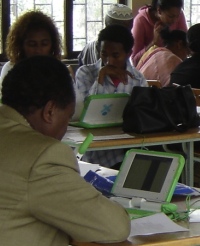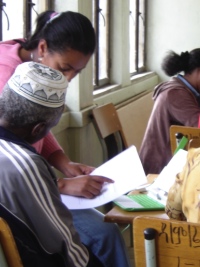After having followed, since October 2008, the OLPC project implementation in six primary schools of the Brescia area in Italy, the second step of my PhD research included a comparative analysis in the developing country where the XO laptop had been donated with the G1G1 initiative: Ethiopia.

XO laptop usage by educators
Four Ethiopian primary schools had been involved in the OLPC project by the ECBP program in September 2008. Two of them, the ones in the rural areas, still have problems with electrical power, so that the first step of the digital divide - the infrastructural obstacle - has not been yet overcome.
The other two schools, being located in the city, see the power problem as a minor one (power cuts are frequent but at least children have access to electricity) and are now facing what we can call the second step of the digital divide: the skill obstacle.
From children side, it is impressive to see how easily they learned to use the XO laptop all alone, without any kind of suggestions or help.
They can write in Amharic, which is very difficult because of the combination of different keys to produce one Amharic symbol, they can make animations with different softwares, they are able to record and personalize pictures with graphical effects and they love recording music and videos from any kind of situations, to listen and watch them again whenever they want. Which is, unfortunately, not only during the break time.
From teachers side, there are more complaints than approvals. Using XO at school means for them extra job. Children do not concentrate on the lesson and keep opening games and recording activities. They do not have the time to test laptop features, as the didactical programme has to be done by the end of the year. Most of them do not find a real motivation for XO use at school, as they see it more as a game than a useful tool for education.

Ethiopia teachers toying with XOs
If teachers use the laptop in their classrooms, it is mostly to read digitalized textbooks on it, which is for children a very boring use, compared to what they can already do with the XO by themselves. And that is why actually pupils do not pay attention to lessons and use the XO for different purposes than the strictly "educative" one.
Given this situation, at the end of april the ECBP team decided to organize a new phase of training for teachers. I participate to the training for 6th grade teachers, to give them some examples of what has been done in Italy with the laptop in this first year of experimentation.
We prepared also for them a sort of methodological manual, where activities corresponded to contents of the different subjects and units. Italian teachers' creativity helped Ethiopian teachers to find their own creativity and adapt the laptop to their didactical methodology. This is exactly how an intercultural exchange of know how should work, in order to build new skills.
Magda Pischetola is a Ph.D student collaborating with the research centre CREMIT (Centro di Ricerca sull'Educazione ai Media, all'Informazione e alla Tecnologia) at the Università Cattolica of Milan


Magda, thanks for your insights on the OLPC pilot schools in Ethiopia. It is very helpful for people involved in OLPC activities in other countries.
Your entry seems to support the decision in Nepal to develop teaching and learning materials that follow and cover all Nepal's national curriculum learning objectives for a full school year.
Do you agree?
In addition, after the first test months last year in two schools, teachers mentioned that they would like the materials to be even more structured so that it follows a week-by-week structure. This change would also help the teachers relate the digital materials to the text and activities in the hardcopy textbooks, and make sure that all curriculum matters are covered at the end of the year. Basically, it helps to ensure that good lesson plans are developed and followed.
This restructuring of materials is now being implemented.
Please visit OLE Nepal's website for more detailed information. The blog entry mentioned below provides a good overview of the efforts in Nepal to integrate laptops into the local classroom teaching and learning situation.
Nepal will in 2010 conduct an impact evalaution of its pilot project that will cover 26 schools in 6 different districts in the country in 2009-10.
http://blog.olenepal.org/index.php/archives/320
You can also sample some of Nepal's newly developed digital teaching and learning materials that the OLPC pilot schools work with here:
www.pustakalaya.org